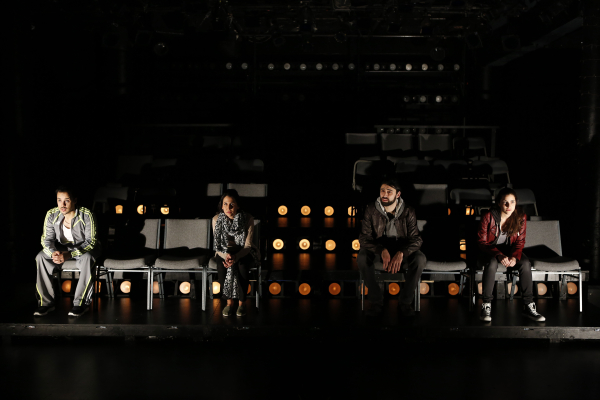I Call My Brothers

(© Carol Rosegg)
When you’re a part of an embattled minority group, are you ever allowed to have a personal life that is not constantly invaded by pressing national issues? Can’t a man have his heart broken without it meaning something much more? These are two of the questions asked by I Call My Brothers, the American premiere of the latest play by Swedish author Jonas Hassen Khemiri, presented by The Play Company at the New Ohio Theatre. This intelligent and humorous adaptation (translated by Rachel Willson-Broyles) convincingly argues that the issues of identity, suspicion, and immigration are just as relevant to Americans as they are to Swedes.
Khemiri originally wrote Jag ringer mina bröder as a prose poem in response to the 2010 suicide bombing in Stockholm. He later expanded that short piece into a novel and adapted it for the stage. While the original Swedish version of the play takes place in Sweden, this American premiere takes place right here in New York City. Khemiri is best known to New York audiences for his riotous identity play Invasion (also produced by PlayCo). He is at the forefront of the debate on race and immigration in his native Sweden: Last year, Khemiri wrote a widely read open letter to Minister for Justice Beatrice Ask in response to her defense of racial profiling on Stockholm’s subway system. Not coincidentally, I Call My Brothers ends on a subway platform, with the central character, Amor (Damon Owlia), being startled by his own suspicious reflection. If you see something, say something.
The play opens with the city reeling from a car bombing in midtown. Amor is a tall and handsome chemistry nerd with a painfully unrequited love for Valeria (Dahlia Azama). He’s hungover after partying all night and only vaguely aware of the bombing after receiving several voicemails from his childhood best friend, Shavi (Rachid Sabitri). Amor’s cousin Ahlem (Francis Benhamou) calls from abroad to ask him to send a new drill head in the mail so she can finish building their grandma’s summer cottage. In the tense aftermath of the attack, Amor rides the train into midtown to visit a hardware store, all the while feeling like he’s being followed and watched. He’s desperately clinging for something, or someone familiar.
Amor tries to greet a swarthy-looking hardware salesman (who he believes could have been his brother) with North-African bro-Arabic for “Hey, whassup babe?” ("Shoo, kifeck habibi?") The reply is a terse “Excuse me?” Meanwhile, Shavi keeps calling, but Amor won’t pick up the phone. Inexplicably, he does pick up for Carrie (also the ridiculously funny Benhamou), an animal rights activist with a Valley-girl accent just barely masking something more distinctly foreign.
“I get that you’re playing the same fake game as everyone else,” he accuses Carrie (whose real name is Golbarg) before threatening her with some pretty graphic violence. It would be easy to dislike Amor if Owlia didn’t play him as such an overgrown puppy dog. Like Carrie, we never really take any of his threats seriously. Amor is an unreliable narrator, offering us a very selective version of events. He smiles and shrugs at the audience in an attempt to excuse his sudden outbursts (which are mostly in his head).
Luckily, the other characters are there to challenge Amor’s narrative. Khemiri has taken a page from Christopher Guest and TV’s Modern Family by having the characters directly address the audience as if they’re being interviewed by a reality-TV producer. This clever yet accessible convention helps cover a lot of the background that comes easily in a sprawling novel, but often feels forced on the time-crunched stage. I Call My Brothers breezes by at a trim 80 minutes.
Daniel Zimmerman’s set is meant to mirror the house of the New Ohio. Director Erica Schmidt gets surprising mileage out of this seemingly inflexible space. The play jumps locations so often, but we never question that these platforms with folding chairs are in fact an interview studio, an apartment, a subway platform, and Times Square. The time and location is always crystal clear.
While the ending is somewhat abrupt and unsatisfying, I Call My Brothers is a sensitive and thoughtful expression of the alienation one man can feel in the wake of a tragedy that results in the collective blame of that man’s “kind.” A segment in which an Aviators-wearing “Supervisor” (Benhamou) tracks Amor’s movements feels particularly appropriate in this updated American setting, in light of the revelations about the NYPD’s Muslim surveillance program. We’re inside Amor’s head and we go on this journey with him. The fact that some of his decisions make little sense is no hindrance to our understanding: We’ve all been there.











